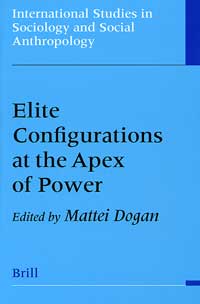
 |
Mattei DOGAN (ed.), Elite Configurations at the Apex of Power, Leiden-Boston, Brill, 2003 (International Studies in Sociology and Social Anthropology)
This book, prepared under the auspices of the IPSA Research Cornmittee on political Elites, focuses on the interpenetration between varjous types of elites : politicuans, owners of capital, corporate mangers, higher state administrators, directors of public enterprises, controllers of media, military officers and the civiccultural establishment. The contributions to this book reveal contrasting patterns of recruitment and selection in terms of career paths, visibility, influence, and power of different elite circles. This diversity of national elite configurations challenges C. Wright Milîs' theory of an integrated 'power elite', which appears from a comparative perspective to be peculiar to the United States during the early post-war period. Key concepts are discussed and empirically tested : ruling class, political class, elite circulation versus elite reproduction, elite interpenetranion ; elite interlocks, elite cohesion, elite osmosis, functional elite roles, formai and informal networks, elite cousinhood, separation versus overlapping between wealth and power, and between power and social capital.
The common denominator of ail chapters is the linkage between the varlous ruling elites, the interconnections at the summit -of power. These interpenetrations suggest the concept of înterlocking which may form, in different contexts, different types of elite clusters.
The authors do not suggest a unique ebte configuration ; on the contrarv, they emphasize a diversity of national situations. There is a gap in the literature between the contemporary theoretical level, predominantiy American, and the empirical knowledge of elite stratification in dozens of countries. It is not by accident that in this book priority has been given to countries other than the USA. The book covers a great variety of countries: post-industrial democracies (France, Britain, Germany, Canada), new democracies (Fast-Central Europe, Mexico), and modemizing regimes (Southeast Asia, Tropical Africa), presented by an international selection of distinguished contributors : Andras Bozoki, Roderic Camp, William Case, Jean-Pascal Daloz, Mattei Dogan, Dennis Kavanagh, Michael Ornstein, David Richards, Erwin Scheuch and John Scott.